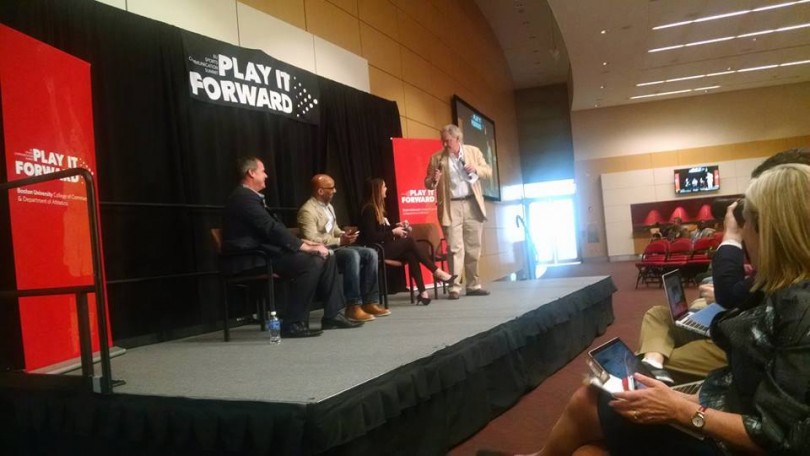By Marisa Ingemi
BU News Service
Almost all topics were on the table in the first Play it Forward sports summit at Boston University on Friday, but one subject in particular took over the discussion with most of the esteemed panelists. In several of the panels, especially the finale of the future of sports journalism, the role of women in sports was heavily discussed and analyzed.
The first panel of the day, dubbed “Breakfast with Champions,” was properly named as it was laden with representatives of each major Boston sports organization. New England Patriots Hall of Famer Andre Tippett, Boston Celtics CMO Sean Sullivan, Boston Red Sox Chairman Tom Werner and Boston Bruins CEO Charlie Jacobs all took center stage in the opening discussion.
Andrea Kremer, a professor at Boston University and a reporter on HBO’s “Real Sports,” hosted the panel and brought up the subject of women involved in the major four sports at an operations level. Currently, the NFL and NBA each have one full-time female assistant coach each, while the NHL and MLB have minimal involvement from women.
“We have more women than men on the business side,” Sullivan said. Sullivan and the rest of the panel also discussed the WNBA as one of the only viable women’s professional sports platforms, with the league bringing in 7,500 fans per game.
Werner mentioned the key to finding more women in the sports industry is to find people out of college who want to learn the business. Historically, Major League Baseball has had few women in the baseball operations side, including the front office and scouting departments.
The last panel of the event had a focus on sports media, hosted by WBUR’s Bill Littlefield with Fox Sports’ Katie Nolan, the Washington Post’s Kevin Blackistone, and ESPN’s Don Van Natta. The discussion of women involved in sports media and women’s sports visibility dominated the discussion.
“We’re talking decades before we see (even coverage) of men’s and women’s sports.” Van Natta said on women’s sports getting equal coverage.
A hot topic in the media of late is the United States national women’s soccer team players making far less money than the less successful men’s national soccer team. Other discussion revolved around negative media attention toward the highly successful University of Connecticut women’s basketball team despite lauding of successful men’s teams in sports.
“There should be more coverage of women in sports,” Blackistone said. “There’s evidence that if you put it on, people will watch.”
An example used were the ratings of the USA women’s national soccer team that drew tremendous ratings during the World Cup. Though not discussed on Friday, the NCAA women’s hockey championship on tape delay was also the most watched college hockey game all season.
“Maybe we could take one story about a tweet Lebron sent, and cover a women’s story instead.” Nolan said.
Nolan also discussed how being a television host focused on sports opinions creates disdain from some viewers, and she and other female sports media personalities have to deal with the comments.
Nolan also talked at length about the narrative stereotype that women in sports television or sideline reporters are only interested in the industry to be around the athletes.
Blackistone also emphasized how women in TV in general, especially in sports, often aren’t taken seriously for their discussion but are valued instead for appearance. He said the next step in getting women more involved in the industry is to value their work above their physicality.
“It seems we value women for how they appear and not whats between their ears,” said Blackstone. “And that’s trouble”




